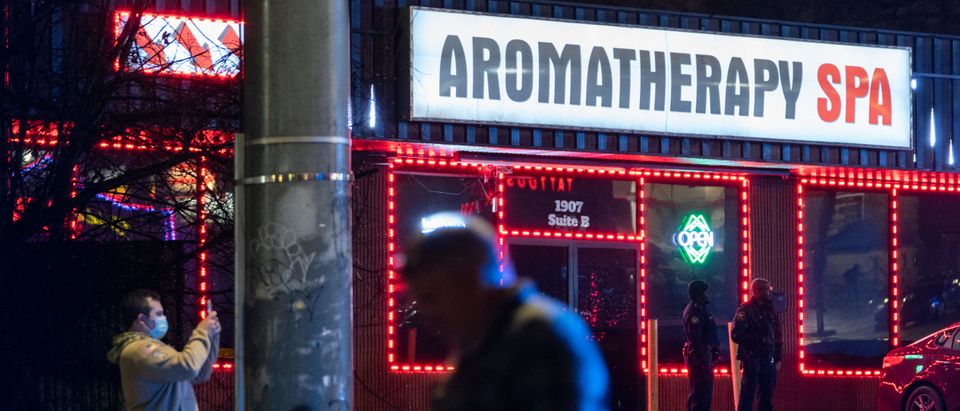A mass shooter faces 10 counts of murder charges in a disturbing attack on innocent civilians in Boulder, Colorado.
There are deep, affecting stories here to be salvaged in this tragedy, of both the perpetrator (who was “paranoid,” according to a former wrestling teammate of his) and of the ten victims, including a police officer, several grocery store workers, and a pilot trainee.
One unfortunate sub-story of this whole tragedy will likely be the so-called “racial identity” of the shooter. There may be a temptation, even, to blame the racial origin of the shooter for motivating the attacks.
“The [Boulder, CO] shooter’s race or ethnicity seems front and center when they aren’t white,” Democratic Minnesota Rep. Ilhan Omar tweeted. But Omar has little credibility to speak on this issue. She posted last week: “it isn’t hard to understand why it’s so normalized for law enforcement to protect the humanity of white mass murderers and their willingness to continually make excuses.”
In fact, some activists have attempted to shoehorn the Boulder, Colorado, shooter’s race into whiteness anyway. Before the name of the shooter was revealed, various Twitter platforms assumed the shooter was white and Christian. Actress Rosanna Arquette tweeted: “Call it what it is ..White supremacist domestic terrorism.” Michael Harriot, senior editor at The Root, tweeted, “Pointing out how white suspects get the benefit of the doubt without being stopped, frisked, beaten, shot or killed is not a call for harsh treatment.” Both those tweets remain undeleted.
All the while, there is actually evidence that the shooter was in fact motivated by perceptions of his non-Christian ethnic religious identity. According to a source in The Denver Post, the Colorado shooter “was often concerned about being targeted because of his Muslim faith.”
“He would talk about him being Muslim and how if anybody tried anything, he would file a hate crime and say they were making it up,” said a former wrestling teammate of the shooter.
Was animus against America, particularly white or Christian America and how he perceived it targeting a man of his background, a factor in the Colorado shooter’s calculus? Unclear. But we shouldn’t make hasty judgments about his motivations, especially his racial or religious motivations, until we find all the evidence. Contrast this approach with the frenzied one of the media during last week’s Atlanta shooting that killed 6 Asian Americans, 1 white American, and 1 Latino American. Despite the “diversity” of victims and the claims by the perpetrator that he suffered from “sex addiction,” the commentariat has proceeded to develop a racial framework of the attacks without the evidence to back it up.
The Atlanta attack was the gateway to a glut of coverage about anti-Asian racism that went from the thoughtful (“Asian females more targeted for violence than males”) to the cloying (“White supremacy is the common denominator between anti-Asian and anti-Black violence”) to the frankly insane (“racism is responsible for every attack against a minority”). Many times, however, especially with regards to tying the Atlanta violence into white supremacy, the coverage was simply wrong.
Look at how fact-free media narratives of white-on-Asian violence is: according to the Bureau of Justice Statistics’ 2018 data, the last known violence dataset that includes Asian Americans as a victim category lists the following groups as the likeliest perpetrators of violence against Asians:
Black – 27.5 percent
White – 24.1 percent
Asian – 24.1 percent
Hispanic – 7.0 percent
Other – 14.4 percent
If we were to craft a racial narrative around these statistics, it would be black Americans, not white, that would be most implicated. But we should never implicate an entire race – black or white – for committing crimes against another race – because every case is at its core an individual case, and racism runs from every color against every other color.
Attempting to tie every mass shooting into commentaries on race is sickening for the country and distracting from the real issues, just as the hypercharged race-based reaction to the shooting in Atlanta last week was distracting from potentially more important stories about sex trafficking in massage parlors, the mental health of the perpetrator or other human rights issues that pertain more relevantly to the actual community of immigrant Asian women in the Atlanta, Georgia, area.
Too many mainstream outlets seem so invested in fomenting a racial hatred narrative that they blatantly apply double standards in their coverage depending on the race of the shooter and of the victims.
What we should do is return to the standards of true journalism – stating the facts, gathering truly diverse perspectives, resisting the temptation to impugn the truth with your own ideological narratives. We must fight back against the dangerous racialization of already violent tragedies for the sake of clicks and ethnic foment. In doing so, we tear apart the country and turn tragedies into cultural disasters.
Kenny Xu is author of the upcoming book An Inconvenient Minority on the lasting consequences of race ideology on Asian Americans and America’s culture of excellence.


